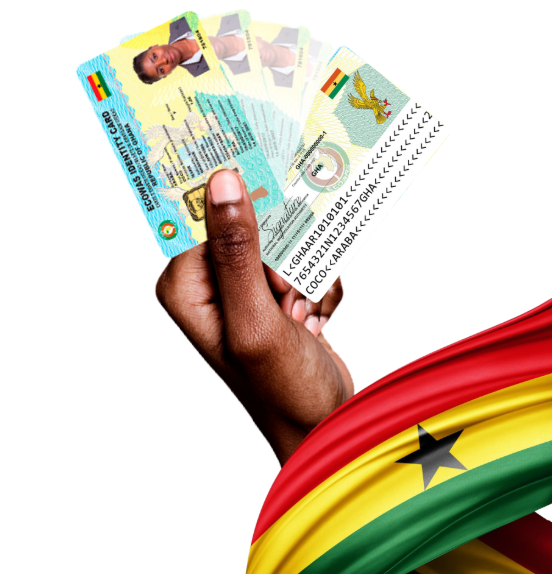HAMILE, Ghana — The road north ends in dust and sunlight, tapering into a bridge where Ghana meets Burkina Faso. Traders cross with baskets of maize and groundnuts, and greetings drift in two languages. The border feels open, almost imaginary, until the government asks for proof of who you are.
For one mother who sells in the market, that proof has never existed. She was born in Ghana, raised there, and buried her parents in the same soil. However, when she tried to register her son for school exams, the headmaster demanded a birth certificate. At the district office, she was told that she also needed the Ghana Card, the biometric ID now required for nearly every official service. She has neither.
“I was born here, my parents are buried here,” she said quietly. “But they say I can’t prove it.”
Across Ghana’s northern borderlands — Bawku, Tatale, and Hamile — thousands of residents face a similar dilemma: communities bound by culture and geography but divided by bureaucracy. Their lives are stitched across the same landscape that colonial cartographers split more than a century ago, and now a new kind of line — administrative rather than physical — determines who counts.
A Border Drawn on Paper
Ghana’s Constitution guarantees equality before the law, and the National Identification Authority (NIA) has promised every citizen a Ghana Card (national ID). In practice, the system leaves wide gaps in the data collection.
Officials announced early this year that new card stocks had arrived and backlog printing would resume; however, rural coverage remains uneven. Registration requires documents — a birth certificate or a relative’s verified ID — that many people here never had. The nearest registration office may be a full day’s travel away from the village.
“Legal identity is the cornerstone of access,” said Cassadee Orinthia Yan, a managing researcher at the Maslow Quest Foundation, which studies nationality and inclusion. “But too many African states have mistaken documentation for identity — as if a card could substitute for belonging. Bureaucracies are built to verify existence, not to recognize it, and this distinction matters. You can live your entire life acknowledged by your community, married, trading, raising children, yet remain invisible to the state because your existence is not stamped or digitized. It’s a profound paradox: governments demand proof of life before they extend the rights that make life visible.”
Yan argues that reforms often stall at the surface level. “We see equality provisions on paper,” she said, “but without real implementation, you create two tiers of citizenship — one recorded, one remembered.”
The Cost of Being Unseen
The consequences of this are tangible. In Tatale, a teenager was barred from taking his final exams due to the lack of a birth certificate. A farmer near Bawku lost access to fertilizer subsidies when he could not produce a Ghana Card. A woman married across the Burkina Faso border said officials demanded “endless proof” before recognizing her children as Ghanaians.
“Trade, marriage, family — it’s all mixed here,” said a local assembly member in Hamile. “But the paperwork stops at the checkpoint.”
Colonial borders sliced through ethnic groups such as the Dagomba and Ewe, whose kinship networks long predated the state. ECOWAS protocols now encourage free movement across West Africa; however, national ID regimes insist on fixed origins and digital records.
Yan calls this the “administrative border” — invisible but decisive. Her research on statelessness across African legal systems finds that outdated documentation rules perpetuate exclusion, even in countries with progressive constitutions. “This isn’t just a legal gap,” she said. “It’s an infrastructure gap — a failure to bring the state to where people actually live.”
Belonging Beyond Paper
The government insists that progress is being made. Mobile registration teams now visit remote districts, and officials have pledged to link the Ghana Card to social protection programs. UNICEF and the World Bank are financing new campaigns to boost birth registration rates, aiming to close the coverage gap that leaves millions undocumented.
However, after years of bureaucratic delays and reports of fraudulent card issuance, public confidence remains brittle. “Trust is the invisible infrastructure of any ID system,” Yan said. “You can distribute cards, but if citizens believe access depends on who you know, not who you are, the entire framework collapses.”
Across West Africa, governments are racing to digitize identities in pursuit of efficiency and security. Yet technology alone cannot erase the histories that fractured belonging in the first place — the distance between rural households and the state, the poverty that turns proof into privilege, the borders drawn long before citizens could contest them. As Yan put it, “Digitization without equity just reproduces exclusion at higher resolution.”
At dusk, the market winds down to a close. The trader gathers her unsold groundnuts and walks the short road home, with one foot in Ghana and the other in Burkina Faso. The checkpoint is quiet, and the border dissolves into the red evening light. She belongs entirely to both sides — and, on paper, to neither.
“I’ll try again next month,” she said, pressing a worn plastic folder against her chest. “Maybe this time, they’ll write my name down.”
Source: newsghana.com.gh











